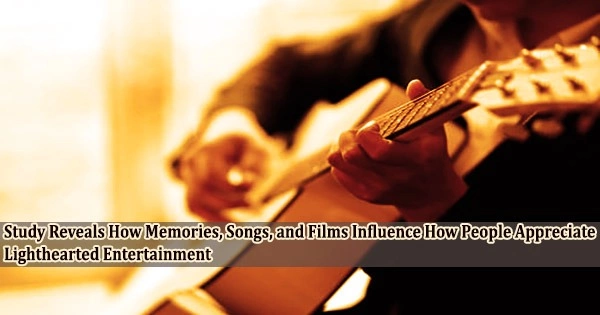Everyone has experienced a music or watched a movie that reminds them of a past experience or recollection. According to a recent study from the University of Kansas, people tend to link older music and movie snippets with happier memories than they do with more recent ones.
The findings help explain why individuals frequently find significance in frivolous entertainment like pop music or superhero movies because people tend to value information that brings back memories more.
Researchers played movie and song clips from artists active today or within the last ten years, as well as song clips, before asking study participants to recall any memories they may have had related to the samples. People enjoyed older music better and older entertainment brought back more memories. Regardless of when it was released, people valued both forms more when memories were triggered.
“What we’re trying to do is understand what happens when we encounter media and how that affects us. We also look at the implications regarding our sense of identity,” said Judy Watts, assistant professor of journalism & mass communications at KU and a co-author of the studies.
“People often travel mentally back to a time period when they re-encounter beloved media, but we want to unpack what exactly they’re experiencing when they do that. Did they have appreciation, happiness or other emotions? Music was picked for the first study because it tends to be especially nostalgic. The second study was designed to see if those same effects would happen with audiovisual cues.”
The studies, written with co-authors James Alex Bonus and C. Joseph Francemone of Ohio State University, were published as a paper in the Journal of Communication.
For the music-based study, more than 400 college students heard six song selections from an artist, released either in 2020 or roughly a decade earlier, during their early adolescence from artists such as Taylor Swift, John Legend or Charli XCX. They were asked whether the song activated a memory, and if so to describe the memory.
People often travel mentally back to a time period when they re-encounter beloved media, but we want to unpack what exactly they’re experiencing when they do that. Did they have appreciation, happiness or other emotions? Music was picked for the first study because it tends to be especially nostalgic. The second study was designed to see if those same effects would happen with audiovisual cues.
Judy Watts
They were also asked about their memory engagement with statements such as “I was so young and naïve in this memory,” “life was so much simpler at the time of this memory” or “I felt completely immersed in this memory.”
For the second study, more than 400 college students were similarly shown clips from a recent or older movie, such as “Frozen” or “Frozen II,” or “Avengers: Endgame” or “Guardians of the Galaxy.” They were then asked the same questions about whether the media had associated memories, and of what type.
Researchers’ expectations were confirmed by study one’s findings, which revealed that songs from an earlier era were more appreciated and caused better memory recall. Furthermore, participants felt that while the recollections were nice, they also believed their lives were better now than they were at the time of the recall since the memories linked with older music were also older, more positive, and had more downward temporal comparisons.
The degree to which a memory was personal or more communal did not differ significantly, but a number of factors, including memory recall, memory immersion, and positive effects, were predictive of enjoyment. The study concluded that suggests people value any form of entertainment that stirs their memories.
The majority of the memory-related findings from the study with music were duplicated in the study with movie clips, especially since older media had more associated memories and were older, more positive, and included more temporal comparisons.
One striking distinction was that, in contrast to generic memories, which were linked to lower levels of appreciation, individual memories were a predictor of content enjoyment. Additionally, people’s levels of appreciation for newer and older movies were similar, with individuals generally having a higher level of enthusiasm for movies than for music.
The findings advance knowledge of autobiographical memory and the role that media influences play in such mental operations. While the ability of a song, movie, or other item of popular media to jog memories has long been recognized and accepted, little research has been done to determine if these recollections lead to fulfilling experiences.
“In contrast, media effects research tends to focus on more “meaningful” media, such as highly regarded, classic or highbrow forms of entertainment, not necessarily lighter fare such as pop songs, superhero movies or other popular forms of entertainment,” Watts said.
It’s crucial to have a better knowledge of how media influences emotions since it has the potential to assist people cope with stress and bad emotions. This is particularly true for the temporal findings investigated in the study, such as whether people believe their lives were better back when they had a media-induced memory, whether they believe their lives are better now than when they were younger, and what kinds of memories are linked to media appreciation.
“We tend to assign meaning to pieces of entertainment we experience in formative times of our lives. That’s typically cast off as something that’s not particularly meaningful,” Watts said.
“But we think it matters because it’s about how you experienced it, often with people we care about, and when we revisit it, we can feel warm, happy or other emotions. We’re interested in the psychological processes of memory and media, and it is one way, I think, to speak to a person’s memories, how they connect media to a time, place or people.”
















